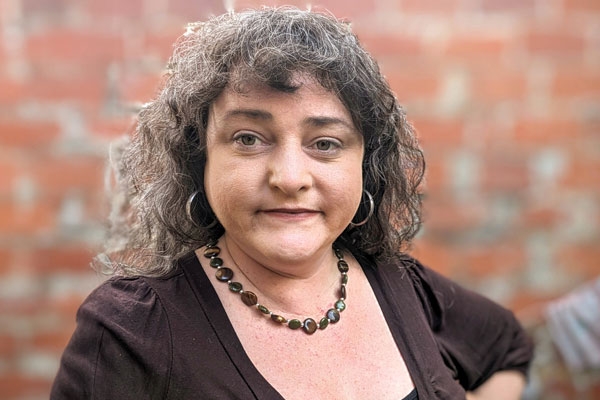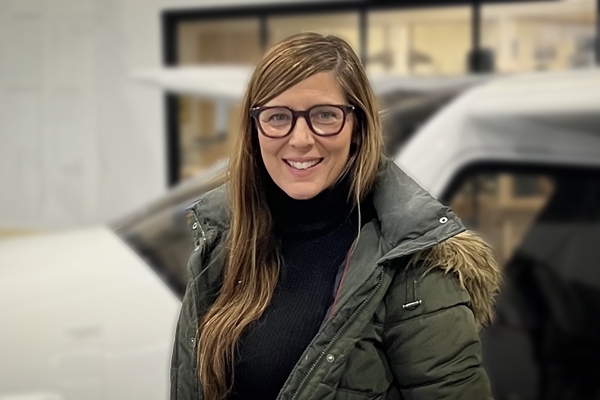The technology that we know today was in its infancy when Scott Barney headed off to college. A career in communication wasn’t in his sights either.
Scott grew up a “military brat.” His father was in the U.S. Army, and Scott and his family lived internationally and domestically based on his father’s assignments. From Korea and Saudi Arabia, to New York, Kansas and Alabama, Scott’s early educational experiences were all over the place up until his junior year in high school.
“I spent part of my junior year taking classes through the mail as I had advanced as far as I could with the history and math classes offered,” he recalls. With a family move to Germany, Scott completed his senior year at the United World College of the Atlantic in Wales and earned an International Baccalaureate in 1985.
Like many of his generation, he didn’t know what career he would end up having once he graduated from Georgetown University—on an ROTC scholarship—with an undergraduate degree in economics and African studies. Destiny intervened.
At the time he graduated in the late 1980s, management consulting firms dominated the job market.
“I knew that I would be serving in the military after I graduated,” Scott says. “I did not know that the U.S. Army would send me to war with Operation Desert Storm; however, that was in the cards.
“Some of my university friends started working at Price Waterhouse, and I was able to get a job with their education department after I completed my Army officer’s training,” he recalls. “I was the assistant to the senior director, who put together the boot camps for our new hires. My group ran the education of our new hires, teaching them COBOL, CICS, DB2 and the new object-oriented programming languages. We would spend approximately three months teaching the new hires before putting them out at billable rates for our customers.”
This was the dawning of tech in business practices, and an ancillary introduction to things to come.
At the start of his time at Price Waterhouse, he helped build the budget for the educational program—housing, rental cars, salaries, facilities and so on—all done through Excel spreadsheets and complex formulas. After Scott returned to civilian life post-tour of duty, he returned to Price Waterhouse and was able to take the training with the other new hires. “Finding that I had some skills in programming, I then became an assistant instructor for our boot camp programs. I ended up teaching a few classes,” he says.
Between his economics background and new training role, Scott inadvertently was introduced to early technical communication.
“I was assigned to Sallie Mae as a contractor for Price Waterhouse, where we were forced to use a method called Information Mapping® Methodology to create procedures for a document-imaging system,” he recollects. “I cringe when I think of the wasted paper, useless screen shots at every step and maintainability of that documentation.”
And so it begins.
Curriculum Development as the In
Scott’s next job was at Informix Software, a database vendor that was eventually bought out by IBM. Initially hired to lead all of the training in their Bethesda, Md., office, he then moved and ran their New York City training office after a couple of years. Then the Bay Area called.
“At some point, they needed someone to assist in developing training courses for our products in the Bay Area; I wanted to live in San Francisco, so I jumped at the opportunity. After a few years, I took over as the head of curriculum development.”
For the next five years at Informix, the need for technical communication skills in the tech industry emerged.
“I came in knowing very little, but soon could talk about relational databases, SQL, system administration on mainframes, Linux/Unix, Windows and more,” Scott says. “This makes it all sound like I am a tech nerd, but honestly, I am not.
“I treat technology like I treat most academics: What do I need to know and how can I summarize it for others who may also need to use the product but may not have the background? We built our content using FrameMaker, PowerPoint and Word. We did not have any content management system. We printed books for our attendees and ran week-long classes that people would fly in for. As an instructor, I would travel across America and internationally to teach at our offices and at customer sites.”
The creation of training materials that he himself used on the job led to the evolution of Scott’s career.
“My preparation for being a curriculum developer was simple: As an instructor, I knew what worked in a classroom and what did not. All classes at this time were still instructor-led training; the concept of computer-based or self-paced training was in its infancy but not yet viable for most companies.”
That was about to change with the Bay Area’s startup culture.
“After I left Informix, I spent a few years trying my luck at startups,” he says. “My first startup was Epicentric, which Vignette eventually purchased. It was a web portal solution, where you selected which content to display on your personal web portal. In today’s world, I would compare it to placing apps on your home screen. The training now seems quite simple: how to add modules to a web page, how to create and permission modules, how to configure modules and so on. Notice the use of ‘how to’—it was procedure driven with a bit of contextual overviews thrown in.”
How-to is foundational to technical communication and documentation. But you still need the background knowledge of a product or service to accurately explain it. In Scott’s case, his technical communication career continued to grow as his tasks, writing skills and content knowledge developed.
For example, while at SenSage, a company whose log management and analysis tool relied on a specialized database and complex SQL, Scott utilized his skills in SQL and database administration. He often ended up doing some professional services in addition to creating the documentation and training for their product.
“This was a true startup; I did all of the documentation, all of the curriculum development and all of the training,” he says. “I used whatever tools I was comfortable with, which meant more Microsoft Word and PowerPoint. It was the first time that I was shown a product and had to do all the work in content development, from analysis to delivery.”
In 2005, Scott began working for Four Js, a software company out of France.
“I loved the idea of working for a French company, I would be working full-time remotely—a novelty back in 2005—with the opportunity of travel, and it would again involve programming languages and databases,” he enthuses.
His actual career progression is a bit fuzzy—“I want to say that I was hired as an instructor but ended up being documentation and training manager”—as it has merged his various work interests and tapped into overlapping skills over the years.
Time to Validate His Professional Experience
“My journey with the Professional Sequence in Technical Communication started with marketing emails from UC Berkeley Extension,” Scott recalls.
“I love learning, and I love taking classes when afforded the time. If you look at my education C.V., there is no technology, there is no content creation, there is no curriculum development—everything I did was based on experience.”
He also states that “this was likely why I still created PowerPoints 25 years into my career; I did what I knew.” And then the COVID-19 pandemic hit, and like many, Scott had time on his hands.
“I was not traveling to France, I was home with my kid, and why not use that time to have a formal education around my inadvertently chosen career?”
It was time to hone his skills, especially in technical editing.
“While I found the technical communication courses very interesting—and props to Arun Nevader for being an engaging instructor—the course that I ended up finding most valuable was the Grammar, Mechanics and Usage for Editors course taught by Elizabeth Asborno,” Scott commends.
“My writing improved in its grammar and conciseness. I became a better editor; the writers on my team are now used to me red-lining unnecessary words. Because of this one online class, our company’s documentation has improved in clarity; something that is of vital importance given that we have many users who speak or read English as a second language. I even offered to pay for my writers to take this course as well!”
Scott was able to apply what he was learning to develop content for products and training materials. He also used his experience in our online learning environment to update the training for Four Js.
“Coincidentally, as I was taking the technical communication sequence,” he says, “we began a movement in-house to move away from instructor-led training and move toward self-paced training, a move intensified by a pandemic that came out of nowhere. Having the ability to participate as a student in a remote training environment that involved a combination of self-paced instruction, instructor interaction over the web and group participation in a forum-like environment provided for a real-life experience into the world that I was now having to create for my own company.”
All of it backed up the skills Scott came into the technical communication program with, in addition to allowing him to rediscover what he loved about the field and his work.
“From the perspective of managing my team, the program assisted me in creating rules and structure backed by the industry rather than just being my personal preference,” he acknowledges.
“Having worked in technical communication for 25 years, I found that I had been doing many things ‘correctly’ for some time, but now I had the education to back up what I was promoting.
“The Professional Sequence in Technical Communication also clarified for me that I was in the role that I wanted to be in,” Scott says of his professional goals. “There are other roles in technical communication that I learned about through the courses, and I am in my happy place of working for a small company in a small team, where decisions rest in our hands alone.”
As for his next steps? At 55 years of age, Scott hopes to remain with his current company until he retires, but does say becoming a better manager of remote teams is part of his goals. “I now manage a group of writers from Ireland and have trainers around the world. I do find that I need to spend less time writing and more time managing, so my next steps are learning to let go of writing—which I love to do—and learning to be an even better remote manager to my team.”
After being in the workforce for many years, Scott’s experience and historical knowledge can provide useful advice to others just now considering honing their communication skills while in a technical field:
“If you cannot get your message across to others, then it does not matter how good your technology is. Ask any database user who has worked with both Informix and Oracle which database is better, and the answer will clearly be Informix; however, Oracle won the communication battle and is now the market leader.”



